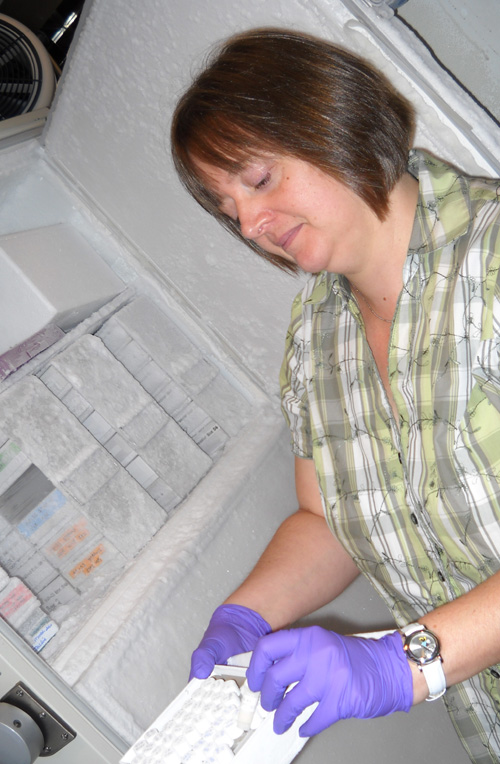
You may one day enjoy better health or disease treatment thanks to a new “treasure trove” of information about your body’s microbes unlocked by international scientists, including a University of Guelph researcher.
That’s the hope of Prof. Emma Allen-Vercoe, Molecular and Cellular Biology, a prominent co-author on two new Nature papers describing the findings of the Human Microbiome Project (HMP).
Funded by the United States National Institutes of Health, the project has involved more than 100 researchers working to spell out genetic sequences for all of the bacteria normally living in and on the human body.
“We have published a treasure trove of information that can be mined in future. This is a picture of health,” says Allen-Vercoe, an expert on human gut microbes and one of only two Canadians on the team.
The new survey provides a kind of reference encyclopedia of microbes that normally inhabit the human body, including the mouth, skin, gut and genitals. Researchers sampled and sequenced the genomes of microflora from almost 250 healthy adults, divided almost evenly between men and women.
The team’s new papers also describe the genomes of 800 species of bacteria, including about 150 strains of hard-to-culture microbes isolated and grown in the Guelph researcher’s lab. Allen-Vercoe has more than 100 more microbes yet to be sequenced and added to the catalogue.
“Of that reference data set of microbes from the human gut, about one-quarter have come from the efforts of my lab,” she says.
Far from serving only as a library, that reference genome collection represents a new tool for understanding the role of microbes in human health and disease, she says.
The information might help doctors dealing with an outbreak of a gut bug like C. difficile or treating patients with irritable bowel syndrome.
The project might help in refining prebiotic and probiotic food supplements containing “good bugs” or nutrients intended to promote gut microflora needed for healthy digestion and nutrient absorption. Such products are available already in yogurt and other foods. But, says Allen-Vercoe, “they’re not very smart right now.”
Knowing more about these microbes might help food and supplement makers tailor products containing specific bacteria of probiotic supplements to various consumers. Or it might eventually help doctors deliver specially designed doses of gut bugs into patients’ intestines – a future possibility that Allen-Vercoe is studying under the whimsical label of “re-poop-ulation.”
She expects to compare microbes in healthy individuals from the HMP with gut bacteria in people with autism.
Elsewhere, she says, researchers might use the new database to plumb other possible gut connections to depression, arthritis, diabetes, allergies, heart disease or cancer. “Every time I look, there seems to be something else.”
Or something else missing.
Many researchers believe lack of childhood exposure to certain bugs stunts our immune system and makes us more vulnerable to allergies.
Worse, says Allen-Vercoe, new mothers on antibiotics may fail to pass on essential microbes to newborns during an unspecified but critical period during early development. Over a few generations, certain bacteria might be lost to our systems entirely – a theory called the “disappearing microbiota hypothesis” championed by Dr. Martin Blaser at New York University.
Researchers are testing these ideas by sampling gut microbes from isolated populations, including indigenous Central Americans and even North Americans whose cultural beliefs forbid the use of antibiotics and pesticides. “With this reference data set of western microbes, it’s going to be interesting to see what a non-western population looks like. If we’re lacking something, maybe we can get it back.”
The Guelph researcher envisions doctors one day screening the gut microflora of newborns and providing missing or deficient microbes by “re-poop-ulation” to ward off, say, allergies or diabetes. “It’s a little science fiction right now, but it’s going to become science fact.
“We need our microbes,” she says. That’s a different view than the common belief held until recent decades that saw bacteria strictly as germs to be eradicated.
Going further, she and other scientists suggest a microbe’s-eye view that regards humans as vessels used by bacteria to ensure their own survival. Does that mean the Human Microbiome Project was more important than the Human Genome Project, completed in 2003 to sequence our own DNA?
One measure: microbial genes in the gut are estimated to contain several million genes, compared to the roughly 25,000 genes in our own genome.
“We have a very backward view of thinking of human cells as being most important. But we’re actually the spaceships for our bacteria. They are more important than we think.”
Allen-Vercoe wouldn’t necessarily call herself less significant than a microbe. But she says the HMP’s recent findings reinforce the idea that species are less important than genes, particularly for bacteria that routinely exchange genetic material.
The HMP team found that people carry around different mixes of bacterial species. But the microbial genes – and the enzymes and molecular pathways that they control – are surprisingly common, and ultimately more important.
That idea might actually make more palatable the idea of administering microbes to treat human disease, whether through smart probiotics or re-poop-ulation. It’s less about mixing and matching bacteria, says Allen-Vercoe, and more about providing the biochemical machinery needed to keep your body humming along.
The HMP began its work in 2008. Its database is now publicly available to researchers anywhere in the world – as are the microbes themselves, held in repositories in various labs.
That includes Allen-Vercoe’s lab, where her homegrown strains are held in boxes of vials inside two -80 C freezers.